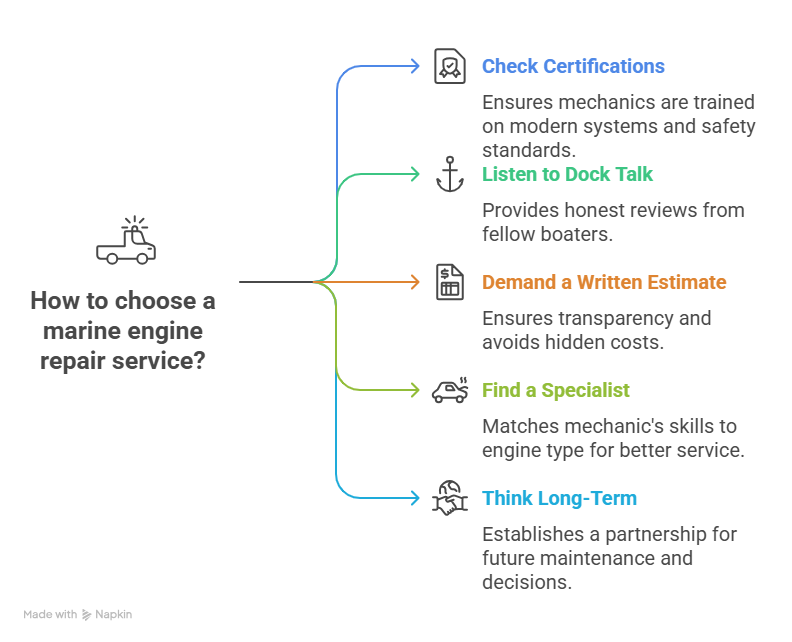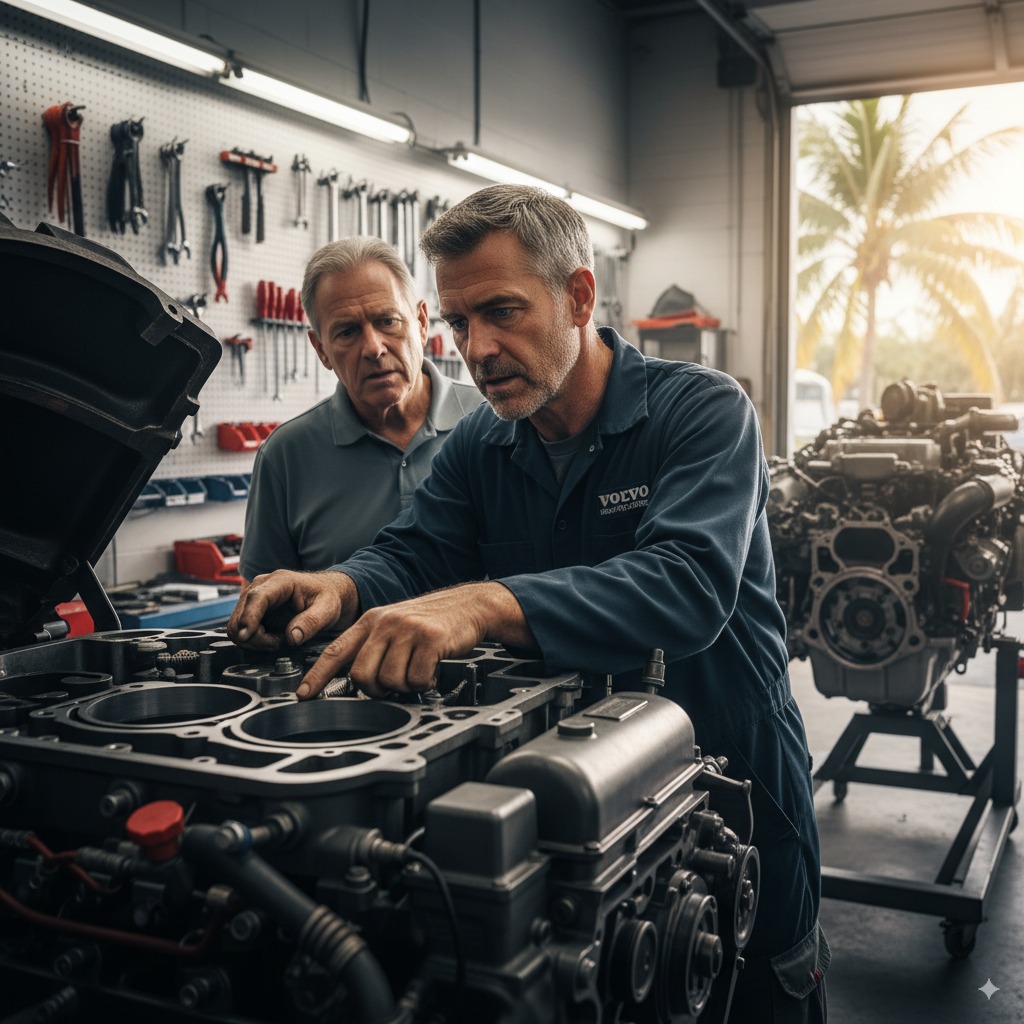The $2,500 Impeller That Taught a Guy a Lesson
I’ve been wrenching on boats in Miami for 20 years, and I’ve seen some real horror stories. But the one that always sticks with me is Javier’s. He brought his Sea Ray 350 to me a couple of years back, fuming. He’d just paid a shop in Fort Lauderdale $800 because his engine was overheating. They told him it was the thermostat, swapped it out, and sent him on his way. First trip out, the alarm screamed again.
Turns out, it was never the thermostat. It was a clogged heat exchanger. A basic pressure test would have shown that. The whole mess cost him another $2,500 with me to do the job right. His mistake? He went with the first cheap quote he found. His experience is a perfect example of why choosing a marine engine repair service is one of the most critical decisions you’ll make as a boat owner.
Finding someone you can trust with the heart of your boat isn’t easy. There are a lot of guys with a wrench and a pickup truck who call themselves “marine mechanics.” So, let’s talk about choosing a marine engine repair service the right way—the way I’d explain it to a friend at the dock at Bahia Mar.
Table of Contents
What to Look For: The Paper Trail and the Dock Talk
Credentials Matter (More Than You Think)
First thing I ask when I hear about a new shop: are their mechanics certified? Look for guys with ABYC or NMMA certifications. It’s not just a piece of paper; it means they’ve been trained on modern systems and safety standards. Even better, are they certified for your specific engine brand, like Yamaha, Mercury, or Volvo Penta? That tells you they have the right tools and training. This is a non-negotiable first step in choosing a marine engine repair service. A clean, organized shop is also a dead giveaway of their professionalism.
Dock Talk is Gold
Forget online reviews for a second. The best advice you’ll get is from the guy three slips down from you. Ask around the marina. Who do the local captains use? Who has a reputation for being honest? A good name in a place like Dinner Key Marina is earned, not bought. Word gets around fast when a shop does good work—and even faster when they don’t. This informal vetting is a huge part of choosing a marine engine repair service wisely.

The Vibe Check: Communication and Transparency
Do They Talk to You Like a Human?
Drives me nuts when shops are cagey or talk down to boat owners. A good mechanic will take the time to explain what’s wrong, show you the broken part, and walk you through the repair options. If they can’t explain it simply, they either don’t understand it well enough themselves or they’re hiding something. Clear communication is probably the most important part of choosing a marine engine repair service.
No Itemized Estimate? Walk Away.
Never, ever agree to work without a detailed, itemized estimate. It should break down labor costs, parts, and any other fees. This isn’t just about the price; it’s about honesty. If a shop is hesitant to put it in writing, that’s a giant red flag. Be wary of a super-low quote, too. It often means they’re using cheap aftermarket parts or cutting corners.
The Money Talk: Repair, Rebuild, or Repower?
This is where things get serious. When you’re facing a big repair bill, you have to decide if it’s worth pouring more money into an old engine. Choosing a marine engine repair service also means finding a mechanic who will give you an honest opinion on this.
Here’s a rough table I put together based on jobs I’ve seen around Miami. Costs can vary, but this gives you a ballpark.
| Service Type | Typical Cost (South Florida) | When It Makes Sense (My Opinion) |
|---|---|---|
| Repair | $500 – $5,000+ | For specific, isolated problems on an otherwise healthy engine. |
| Rebuild | $8,000 – $15,000+ | When the engine block is solid but internal parts are worn. A good rebuild can give you years of new life. |
| Repower (New Engine) | $20,000 – $50,000+ | For catastrophic failures (like a cracked block) or when an old engine becomes a money pit. |
A guy came to me last year with an ancient Volvo Penta diesel. The repair estimate was almost $10,000. I told him straight up: “You can fix it, but something else will break next year. It’s time to think about repowering.” He was grateful for the honesty. A good mechanic helps you with the tough decisions, making choosing a marine engine repair service about a long-term strategy, not just a quick fix.
Not All Mechanics Are the Same: Finding a Specialist
Don’t take your high-performance outboard to a guy who only works on old inboard diesels.
- Diesel Mechanics: These engines are a different beast. They require specialized knowledge of fuel systems and heavy-duty components. Look for shops that are known for diesel work.
- Outboard Experts: Outboards have their own common issues—carburetors, lower units, electrical gremlins. A mechanic who specializes in brands like Yamaha or Mercury will diagnose problems way faster.
- Small Engine Guys: Even the little engine on your tender needs proper care. Find a shop that doesn’t turn up their nose at small jobs.
The process of choosing a marine engine repair service must include matching the mechanic’s skills to your engine’s specific needs.
FAQ: Questions I Get All the Time at the Marina
How much should a diagnostic cost?
It depends, but expect to pay for at least an hour or two of labor ($150-$300). A good shop will usually apply that cost to the final repair bill if you go ahead with the work.
Mobile mechanic or a brick-and-mortar shop?
Mobile guys are great for routine maintenance and simple fixes. But for a major job? I want that engine in my clean, well-lit shop where I have all my tools, hoists, and diagnostic equipment.
Is it okay if I bring my own parts?
Honestly, most shops (including mine) don’t like it. We can’t warranty the part, and if it’s wrong, it wastes everyone’s time. It complicates the process of choosing a marine engine repair service and the subsequent job.
How do I know if I’m getting ripped off?
Your gut is a pretty good guide. If it feels shady, it probably is. Always get a second opinion for any big job. A good mechanic will never pressure you.
Why are marine repairs so damn expensive?
Because everything is harder on a boat. Access is terrible, parts are specialized and corrosion-resistant, and the work environment is trying to destroy everything. You’re not just paying for a wrench-turner; you’re paying for expertise in a very tough field.
So, What’s the Bottom Line?
Look, choosing a marine engine repair service correctly from the start saves you headaches and a ton of money. This isn’t something to rush. If you’re serious about keeping your boat reliable, this is the stuff that really matters. The advice I give my clients before they write any checks:
- Check for Certifications: Make sure the mechanics are ABYC-certified. It’s a baseline for professionalism.
- Listen to Dock Talk: Your fellow boaters are your best source of honest reviews.
- Demand a Written Estimate: If they won’t put it in writing, walk away. Period.
- Find a Specialist: Match the mechanic to your engine type. A diesel expert for a diesel engine, an outboard guy for your Yamaha.
- Think Long-Term: A good mechanic is a partner. Choosing a marine engine repair service is about finding “your guy” who will help you make smart decisions for years to come.
Author Bio
I’m Alex, a 15-year marine technician in South Florida, ABYC-certified. From blown diesels to finicky outboards, I’ve seen it all. I specialize in diagnosing the tough problems other shops give up on, helping boaters at marinas like Dinner Key and Bahia Mar get back on the water with confidence.


Leave a Reply